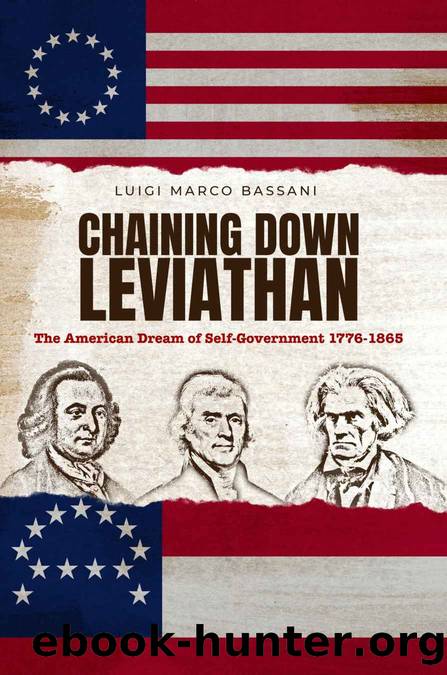Chaining Down Leviathan: The American Dream of Self-Government 1776-1865 by Luigi Marco Bassani

Author:Luigi Marco Bassani [Bassani, Luigi Marco]
Language: eng
Format: mobi
Publisher: Abbeville Institute Press
Published: 2021-03-27T00:00:00+00:00
Webster denied the possibility that the States could interpret the Constitution and decried the âabsurdityâ of considering the federal government âservant of four-and-twenty masters.â[552] âIf there be no power to settle such questions, independent of either of the States, is not the whole Union a rope of sand?â[553] The Supreme Court was obviously that power. The true sovereign of every political organization was the people, not the people of the various States, but rather the people of each State in relation to its own legal system, and the American people as a whole to the Constitution. âWe are all agents of the same supreme power, the People. The General Government and the State Governments derive their authority from the same source.â[554] With regard to the Constitution, âIt is, sir, the Peopleâs Constitution, the Peopleâs Government; made for the People; made by the People; and answerable to the People. The People of the United States have declared that this Constitution shall be the Supreme Law. We must either admit the proposition, or dispute their authority. The States are, unquestionably, sovereign, so far as their sovereignty is not affected by this supreme law.â[555]
This was the crucial point: predicating the existence of a single people that had collectively given rise to the Constitution, Webster, emotionally if not logically, pulled the rug out from under Calhoun and his followers. It was for him necessary to find a source from which the Constitution arose and which was disconnected from the States: This turned out to be âthe People of the United States.â[556] It was here that Webster masterfully played off the Constitution itself.
It is true that the preamble of the Constitution refers to the peoples of the various States, just as Calhounâs followers maintained, but âthe Constitution itself, in its very front, refutes that idea: it declares that it is ordained and established by the People of the United States. So far from saying that it is established by the Governments of the several States, it does not even say that it is established by the People of the several States; but it pronounces that it is established by the People of the United States, in the aggregate. The gentleman says, it must mean no more than the People of the several States. Doubtless, the People of the several States, taken collectively, constitute the People of the United States; but it is in this, their collective capacity, it is as all the People of the United States, that they establish the Constitution.â[557] Thus it was not even necessary to force the historical reality to identify the master over the Constitution. Although the States were completely unaware of it, in Websterâs view they acted as a portion of the American people and ratified the Constitution as a part of a collective and aggregate entity. As historically indefensible as it was, this thesis of an American people and its Constitution and Union was gaining ground.
Several classic elements of European public law were evident in Websterâs discourse, denying the contractual nature of the Constitution.
Download
This site does not store any files on its server. We only index and link to content provided by other sites. Please contact the content providers to delete copyright contents if any and email us, we'll remove relevant links or contents immediately.
| Civil Rights | Discrimination |
| General | Human Rights |
Day by Elie Wiesel(2786)
The Age of Genius by A. C. Grayling(2592)
Gideon's Spies: The Secret History of the Mossad by Gordon Thomas(2355)
The Gulag Archipelago (Vintage Classics) by Aleksandr Solzhenitsyn(2106)
FATWA: Hunted in America by Pamela Geller(2013)
Columbine by Dave Cullen(1870)
Men Explain Things to Me by Rebecca Solnit(1729)
The Rule of Law by Bingham Tom(1701)
Anatomy of Injustice by Raymond Bonner(1671)
Examples & Explanations: Administrative Law by William F. Funk & Richard H. Seamon(1649)
Three Cups of Tea by Greg Mortenson(1620)
The Source by James A. Michener(1619)
That Every Man Be Armed by Stephen P. Halbrook(1584)
ADHD on Trial by Michael Gordon(1581)
Future Design by Unknown(1580)
Gideon's Spies by Gordon Thomas(1512)
Palestinian Walks by Raja Shehadeh(1499)
Constitutional Theory by Carl Schmitt(1458)
Nothing to Envy by Barbara Demick(1451)
